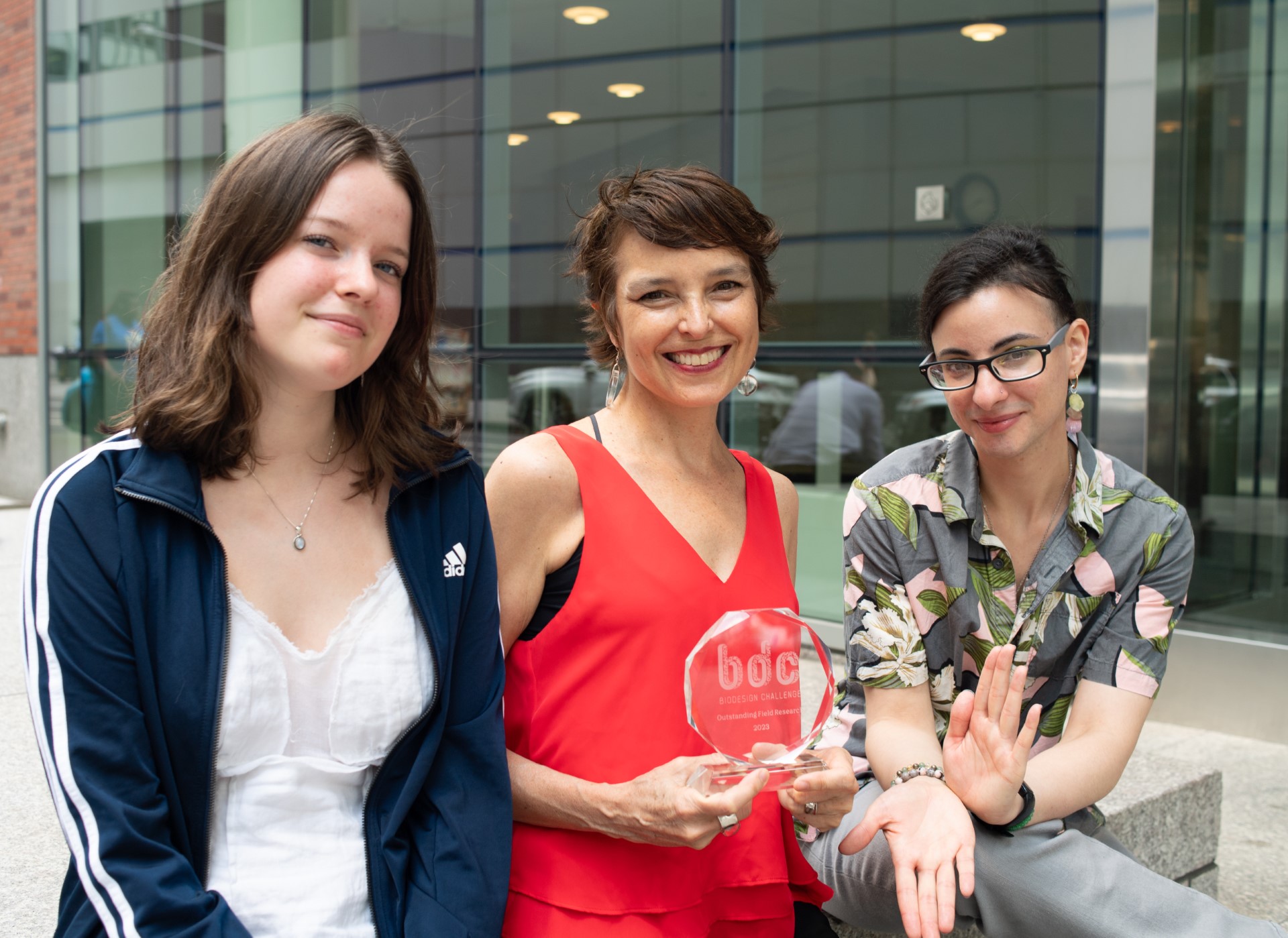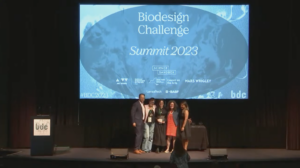
July 13, 2023
Borough of Manhattan Community College (BMCC/CUNY) made a splash in 2022 with the first community college team to participate in the global Biodesign Challenge Summit. Now a second BMCC student team — Psychology major Irina Nissen, who is planning to major in Arts Management, and Engineering Science major Elim Soto — has been named Outstanding Field Research Winner at the Biodesign Challenge Summit 2023 held June 22 and 23 at the Parsons School of Design, The New School and the Museum of Modern Art.
The 2023 BMCC team competed with 44 teams from four-year colleges around the world.
The students’ project, “Mydeco: Mycological Decomposition,” addresses textiles waste and the release of microfibers into the air and waterways. To remedy that, the women are proposing a textile recycling process using a type of plastic-eating mushroom.
“The learning process that led us to our plastic-eating fungi candidate, pestalotiopsis microspora, began with researching the detriments of the fashion industry and the industry as a whole,” says Ms. Nissen.

“We observed that textile waste heavily contributes to water and air pollution that disproportionately affects marginalized communities. We knew we wanted our project to combine fashion and biodesign and began looking at existing eco-clothing brands like Mylo, which offers an alternative to leather, as well as the work of designer Stella McCartney, who also produces mushroom-leather products, and brands such as Reformation and For Days that seek to eradicate pollution brought on by over-consumption.”
One thing the two students noticed in their research, which was guided by BMCC Social Science Professor Elizabeth Wissinger, was that sustainable brands are not cost-effective for the consumer.
Also, says Ms. Nissen, “Sustainable brands that propose constant reuse of clothing don’t address how our clothing sheds microplastics as we wear them. It was from this research that the team started to focus on what we could do to alter existing systems rather than create something entirely new. We envisioned that our company could ‘intercept’ in a way, by collecting clothing to be biologically decomposed before it enters landfills. Mydeco’s recycling model proposes a true end-of-life solution while also keeping the consumer and our community in mind.”
Students join a growing international biodesign community
Ms. Nissen credits several professionals, both at BMCC and in the field of sustainable clothing, for help in developing the Mydeco project.
“Of course, Professor Wissinger helped us with our project tremendously,” she says. “Down to the last day she held our team together and helped us overcome several obstacles. Our team also had the opportunity to talk to two professionals who helped in developing our project as well. We spoke to Nikki Player, director of materials at Reformation, a sustainable clothing brand, who talked to us about the logistics of our recycling model and how sourcing works for brands like Reformation. We also spoke to Fiona Bell, a Ph.D. candidate working with biomaterials in the Living Matters Lab at the ATLAS Institute, Colorado University, Boulder.”
In addition, she says, “I believe that a major part of why our project was so strong was the vast amount of research we collected. This couldn’t have happened without the students and community we were able to interview at BMCC. Winning in the Outstanding Field Research category also couldn’t have happened without the help of Computer Information Systems Professor Mohammad Azhar, who connected us to the computer science students at BMCC and helped us with our gallery poster.”
The Biodesign Challenge is a nonprofit, international competition and education program for high schools and colleges that introduces students to the intersection of biotechnology, art and design.
“As participants in the annual competition, students become part of a growing international biodesign community. They gain access to webinars, experts who serve as resources, biodesign projects and alumni events that take place in museums, galleries and through accelerator programs,” says Professor Elizabeth Wissinger. “Most of all, they are able to exchange ideas and network with their peers from around the country and the world, who are applying biological concepts to design projects that have the potential to improve our quality of life and support the environment in many fascinating ways.”
Participation in Biodesign Summit is part of NSF-funded Technology Learning Community at BMCC
The students’ participation in the Biodesign Summit is part of a larger effort at BMCC to expose students to STEM thinking “in non-intimidating activities in formal and informal settings,” says Professor Wissinger. “We proposed to bridge the gap between formal and informal learning and create a Technology Learning Community at BMCC.”
These efforts have been supported by a National Science Foundation (NSF) grant awarded in 2021, and which fund the project, “Hispanic Serving Institution (HSI) Implementation and Evaluation: Bridging the Gap: Designing a Technology Learning Community Integrating Computational Thinking to Improve STEM Engagement Across Disciplines.”
The project’s Principal Investigator (PI) is Computer Information Systems (CIS) Professor Mohammad Azhar. CIS Professor Younes Benkarroum and Sociology Professor Elizabeth Wissinger are the co-PI’s on the project.
“In addition to participating in the Biodesign Summit, students have been exposed to computational thinking through classroom activities such as designing a robot as part of a sociology class and participating in a Hackathon, which we renamed as an ‘Ideathon,’ and shaped as a STEM Innovation Challenge for Social Good,” says Professor Wissinger.
All along, she says, students have been surveyed to track how their attitudes toward computational thinking and STEM engagement have changed.
“So far, so good,” she says. “We have reached 600 students and changed quite a few hearts and minds, in terms of the students’ confidence regarding their ability to engage with or contribute to the field of STEM.”
Professor Wissinger adds that this latest win, the Biodesign Summit, opens more doors for students on track to blend disciplines and apply technology to projects that are meaningful to them.
Student participation in the Biodesign Challenge Summit relates to the college’s Strategic Goal 5: Integrate career development throughout the student experience.
STORY HIGHLIGHTS
-
Led by Social Science Professor Elizabeth Wissinger, a student team; Irina Nissen and Elim Soto, was named Outstanding Field Research Winner at the Biodesign Challenge Summit 2023
-
The students competed with 44 teams from colleges and universities around the world
-
Their project, “Mydeco: Mycological Decomposition,” addresses textile waste and the release of microfibers into the air and waterways by proposing a textile recycling process using a type of plastic-eating mushroom.

